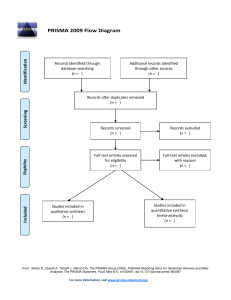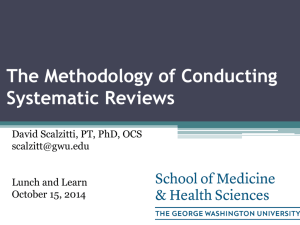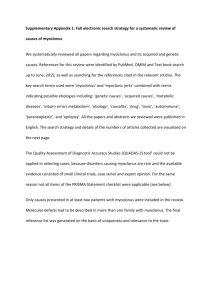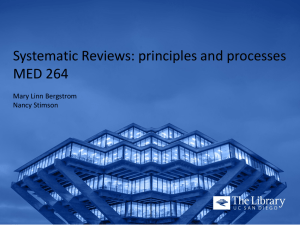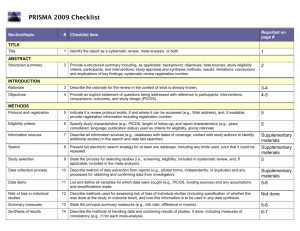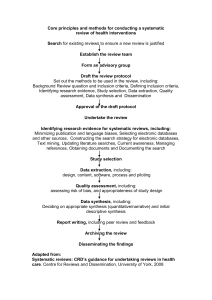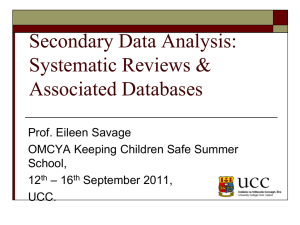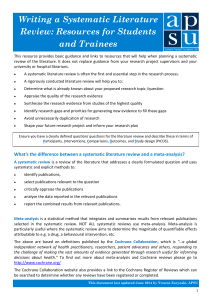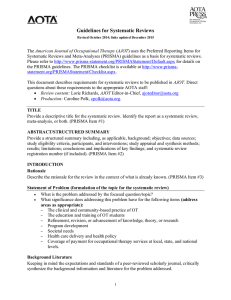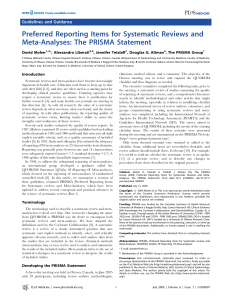20140825_SUNYPresentation2014
advertisement
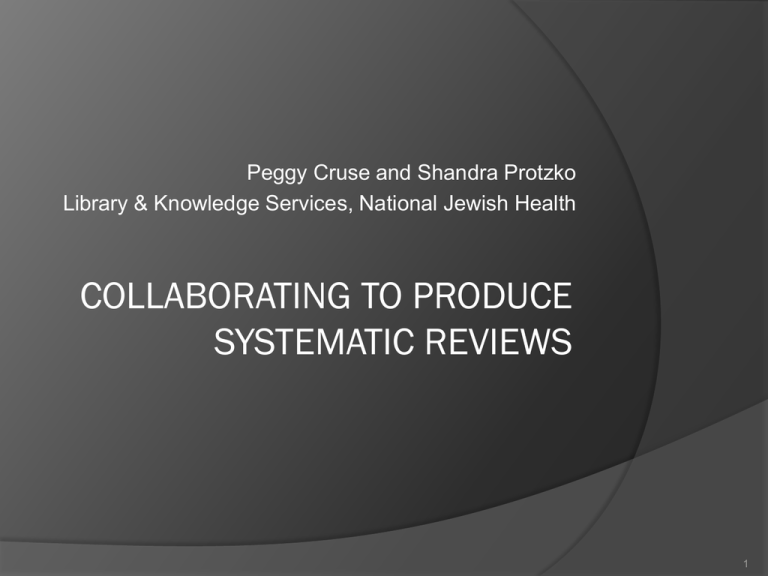
Peggy Cruse and Shandra Protzko Library & Knowledge Services, National Jewish Health COLLABORATING TO PRODUCE SYSTEMATIC REVIEWS 1 Agenda Background SRs in the context of publishing SRs and the librarian The SR process For the investigator For the librarian Discussion 2 Why is everyone talking about SRs? “attempts to collate empirical evidence that fits pre-specified eligibility criteria to answer a specific research question.” (Liberati et al) Climate of best practice IoM Standards Society publishing standards PRISMA - Preferred Reporting Items for Systematic Reviews and Meta-Analysis Grade - Grading of Recommendations Assessment, Development and Evaluation Resources: GRADE, IoM report, PRISMA, J Amer Dental Assoc 3 Why do a systematic review? Reduce bias in how conclusions are reached Improve the power and precision of results Too much information - summarize evidence about the effectiveness of particular approaches for addressing a public health problem Analyze generalizability of findings Too little information - identify knowledge gaps and need for additional research 4 MOU/Level of service Getting paid Authorship Timeline Services Formulate a searchable question Peer review search Citations in reference management software Screening sheets Document the results/methodology Resources: ICJME, AGREE 5 Resources: ICJME 6 What the investigator is doing Define the question/ inclusion criteria Search for studies Select studies/collect data Assess risk of bias in studies Address reporting bias Present results and ‘summary of findings’ tables Interpret results/ draw conclusions Resources: Cochrane handbook 7 What you are doing Define the question/inclusion criteria Define the question Search for studies Peer reviewed search Select studies/collect data Export results/screening sheets/document Assess risk of bias in studies Wait Address reporting bias Wait some more Present results and ‘summary of findings’ tables Document the results and write the methodology Interpret results/draw conclusions Wait for publication 8 Reference interview: define the question PICO In children with influenza-like illness, does treatment with oseltamivir (compared to combination therapy or no drug) reduce mortality and duration of symptoms? Resources: GRADE, IoM report, Journal of the American Dental Association 9 Searching Scope Search Final Search MeSH and text words Revisions Numbers Peer review Sample results Select databases Grey lit ○ Pharma, .gov, etc. ○ Publication bias 10 11 Explaining the search Tips and Tricks [square brackets] to annotate lines Excel to group related concepts Other visualization tools? ○ Adobe Illustrator ○ eulerAPE Resources: eulerAPE 12 Concepts drawn in Illustrator 13 EulerAPE 14 Export Tips and tricks De-dup Save everything!! Name EN files w standard conventions ○ Date_Subject_Screen#.enlx ○ 20140825_IPF_1stScreen.enlx 15 Record keeping 16 Write the methodology Resources: PRISMA 17 PRISMA 2009 Flow Diagram Identification PRISMA Flow Diagram # of records identified through database searching # of additional records identified through other sources Eligibility Screening # of records after duplicates removed # of records screened # of records excluded # of full‐text articles assessed for eligibility # of full‐text articles excluded, with reasons Included # of studies included in qualitative synthesis # of studies included in quantitative synthesis (meta‐analysis) 18 Tools RevMan: prepare reviews http://ims.cochrane.org/revman/download GRADEPro: create ‘summary of findings’ (SoF) table http://www.gradeworkinggroup.org/toolbox/index.htm HLWiki International, Software for Systematic Reviewing http://hlwiki.slais.ubc.ca/index.php/Software_for_systematic_reviewing CADTH Peer Review Checklist for Search Strategies http://www.cadth.ca/en/resources/finding-evidence-is/peer-review-searchstrat 19 Resources AHRQ Effective Health Care Program Guides http://www.effectivehealthcare.ahrq.gov/search-for-guides-reviews-andreports/?pageaction=displayproduct&mp=1&productID=318 Appraisal of Guidelines Research and Evaluation (AGREE) AGREE is an international collaboration of researchers and policy makers who work together to improve the quality and effectiveness of clinical practice guidelines by establishing a shared framework for their development, reporting and assessment. Centre for Reviews and Dissemination Guide http://www.york.ac.uk/inst/crd/SysRev/!SSL!/WebHelp/SysRev3.htm Cochrane Handbook for Systematic reviews of Interventions. Updated Version 5.1.0http://handbook.cochrane.org/ Updated: March 2011 Cruse PE and Protzko SP (2014). Librarian Contributions to Clinical Practice Guidelines, Medical Reference Services Quarterly, 33:3, 327334, DOI: 10.1080/02763869.2014.925710 EulerAPE. Area-proportional Venn diagrams. http://www.eulerdiagrams.org/eulerAPE/ 20 Resources Grading of Recommendations Assessment, Development and Evaluation (GRADE) A systematic approach to grading the strength of management recommendations can minimize bias and aid interpretation of expert-created medical guidelines. The IDSA began to employ the use of the GRADE system in new guidelines and guideline updates initiated after October 2008. IoM: Finding What Works in Health Care: Standards for Systematic Reviews http://iom.edu/Reports/2011/Finding-What-Works-in-Health-Care-Standards-forSystematic-Reviews.aspx Released: March 23, 2011 JADA Submissions and Author guidelines http://www.ada.org/en/publications/jada/submissions-and-author-guidelines Liberati A, Altman DG, Tetzlaff J, et al. (2009). The PRISMA statement for reporting systematic reviews and meta-analyses of studies that evaluate health care interventions: explanation and elaboration. PLoS Med 6(7): e1000100. doi:10.1371/journal.pmed1000100 Moher D, Liberati A, Tetzlaff J, Altman DG, The PRISMA Group (2009). Preferred Reporting Items for Systematic Reviews and Meta-Analyses: The PRISMA Statement. PLoS Med 6(6): e1000097. doi:10.1371/journal.pmed1000097 PRISMA: http://www.prisma-statement.org/statement.htm PICO: McMaster Formulating questions and choosing outcomes http://cebgrade.mcmaster.ca/QuestionsAndOutcomes/index.html Systematic Reviews and Protocol Registries http://nihlibrary.campusguides.com/c.php?g=38332&p=244525 21 Questions/Comments 22
